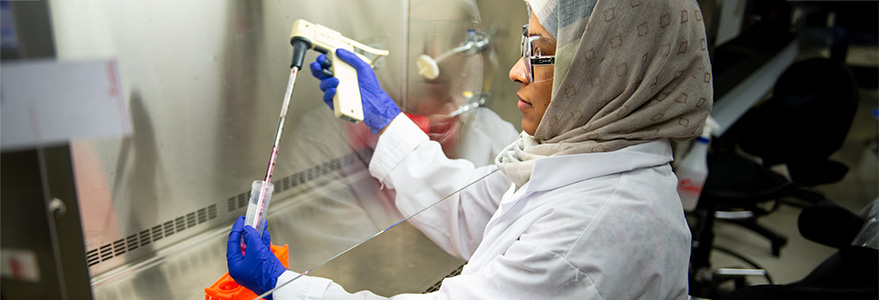PhD candidate combines passion for research with teaching

By Kendra Seguin
In Amena Aktar’s home country of Bangladesh, students are required to decide what career path they want to pursue by grade nine. But Aktar was already sure she wanted to pursue science in grade six.
Now a doctoral student in the Department of Microbiology & Immunology at Schulich School of Medicine & Dentistry, she remembers the moment that sparked her interest in science. Flipping through the pages of her biology textbook, Aktar was fascinated by the way green blades of grass could turn white if they did not receive enough sunlight to make their own food.
It was not plants that caught Aktar’s eyes – it was science and the processes behind them.
Today at Schulich Medicine & Dentistry, Aktar is researching a condition called atherosclerosis, which refers to the buildup of plaque on blood vessels. This plaque prevents blood from flowing to the heart, which can cause a heart attack.
“It’s kind of amazing because some of the techniques that she’s developed for her project are now being used in completely different projects.”
- Bryan Heit, PhD
According to Statistics Canada , heart diseases were the second leading cause of death in Canada in 2022, only after cancer.
“It is one of the main causes of death worldwide, which basically causes heart attack or brain stroke, so that’s why starting on atherosclerosis research is important,” said Aktar.
In a healthy person, white blood cells called macrophages clean up bad cholesterol and dying cells from the bloodstream. However, when macrophages have too much of a specific gene, called GATA2, they do not do their job properly. The bad cholesterol, dead cells, and macrophages stick together to create the plaque that limits blood flow.
Aktar’s research investigates macrophages containing GATA2 to determine their role in atherosclerosis.
Research into the relationship between macrophages and atherosclerosis is a different approach, said Aktar’s supervisor Bryan Heit, PhD , associate professor in the Department of Microbiology and Immunology.
“A lot of the therapies and approaches up until this point really focus on cholesterol,” explained Heit. “And it's helping people make a lot of improvements, but, I think we've kind of hit the limit of what that can do for patients.”
Through her research, Aktar hopes to contribute to finding a treatment that would reduce plaque buildup.
Earlier this year, Aktar received the Drs. Madge and Charles Macklin Fellowship for Teaching and Research in Medical Science. The award recognizes full-time Schulich Medicine & Dentistry doctoral students who show excellence in teaching and research.
A mentor to her peers
“This was one of the reasons that encouraged me to teach people … [My friends] always told me that whenever I explained something to them, they could understand it.”
- Amena Aktar, PhD candidate
Aktar is an active contributor to the community in her lab, located at Western’s Dental Sciences Building. She acts like a mentor to her peers, teaching them the techniques she’s used in her research and helping them to apply those techniques to their own work.
“It’s kind of amazing because some of the techniques that she’s developed for her project are now being used in completely different projects,” said Heit.
When Aktar was completing her undergraduate degree, she and her friends had a study group. They met in the library or sat on the grass outside to help each other with coursework. This is where Aktar developed a passion for teaching.
“[My friends] always told me that whenever I explained something to them, they could understand it,” said Aktar. “This was one of the reasons that encouraged me to teach people.”
Aktar has been a teaching assistant (TA) for four years at Western. Currently, she is a TA for the Microbiology Laboratory undergraduate class.
With the exception of teaching, Aktar is putting all of her time into her research for the final year of her doctoral program. After she graduates, her goal is to continue researching.
“I want to be in research. That’s what I know for sure,” said Aktar. “But where I’ll go? I don’t know yet.”








